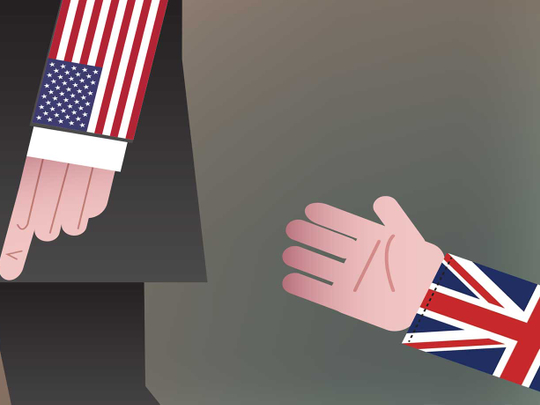
The United States is physically moving away from the United Kingdom and the rest of Europe at the rate of only a couple of centimetres a year — thanks to the shifting of tectonic plates in the Earth’s crust. But the distance between US President Barack Obama and British Prime Minister David Cameron underwent a seismic shift last week as a result of the president’s stinging criticism.
Obama accused Britain and France of failing Libya by not ensuring stability, following the downfall of Muammar Gaddafi in 2011, adding that Cameron was “distracted by a range of other things” and even accusing Europeans of being “free riders” when it comes to supporting military action. His public rebuke was surprising and its timing — with the 54-year-old in his final year of office — suggests Obama is becoming increasingly concerned about the state of his foreign policy legacy.
When he steps aside in January next year, he could be forgiven for looking back on his second term in particular with a sense of regret. While he has been successful in reaching out to Cuba and Iran, his policy of non-interventionism in the Middle East — firstly in Libya and then in Syria, even after Syrian President Bashar Al Assad crossed the “red line” of using chemical weapons on his own people in 2013 — has attracted much criticism.
So the US president has lashed out, passing the blame for Libya’s post-uprising chaos to Cameron and former French president Nicolas Sarkozy. Cameron, who has been unable to match German Chancellor Angela Merkel as the incumbent European leader of choice for the Obama regime to turn to and trust, will be particularly perturbed. Not only has he allowed Britain’s ‘special relationship’ with the US to slip since coming to power in 2010, but he also faces the uncertainty of his country’s referendum on European Union (EU) membership this summer, which could further damage relations with the White House.
Obama is set to visit the UK next month to tell voters why he believes Britain should stay in the EU, boosting the pro-’remain’ Cameron and his supporters, but also putting his colleague in his place — thanks to his popularity and influence on these shores.
Obama’s criticism has ensured the political continental drift has picked up pace and that looks set to continue in the coming months. But what will Obama’s successor make of the situation?
There will be issues for Cameron (or his replacement, should he fail to hang on to power in the wake of the referendum) to address whoever is elected the 45th President of the United States. Republican front-runner Donald Trump would be an unpopular winner among the British people (580,000 of them signed an online petition, saying he should be blocked from even entering the UK) and his abrasive, uncompromising style would likely ruffle feathers in the corridors of power. However, if he thought he could gain some benefit from embracing the UK, the controversial businessman with interests in Scotland is more than capable of adopting a conciliatory tone in an attempt to repair the damage done by his boisterous nomination campaign.
Souring of ties
Likely Democrat candidate Hillary Clinton would be more widely welcomed, but her political history suggests the special relationship might not be too high on her list of priorities. Rarely has the two countries’ alliance suffered more than during the presidency of Clinton’s husband Bill in the 1990s as he suffered stormy fallouts with John Major over intervention in Bosnia and the granting of a visa to Sinn Fein leader Gerry Adams. And, as recently as 2010, Hillary herself contributed to a souring of ties by supporting Argentina’s call for negotiations on the sovereignty of the Falkland Islands — a touchy subject for the British.
It is being ignored that once Obama’s second term is over, there is a real worry for the UK and for Europe as a whole. And, with the UK unsure of the benefits of the EU, the doubty Merkel, rocked by poor regional election results last week, and uncertainty enveloping the divided continent’s economy, it’s becoming easy to see why the next US president may first look East to secure America’s position with the powerhouses of eastern Asia, before turning his or her attention across the Atlantic.
This month saw the 70th anniversary of Winston Churchill’s famous speech at Westminster College in Fulton, Missouri, where he first described the UK’s special relationship with the US. “Neither the sure prevention of war, nor the continuous rise of world organisation will be gained without what I have called the fraternal association of the English-speaking peoples. This means a special relationship between the British Commonwealth and Empire and the United States,” he said in 1946. But now, the Brits may finally be seeing that unique status drift off into the sunset.
Martin Downer is a freelance journalist based in the United Kingdom.









